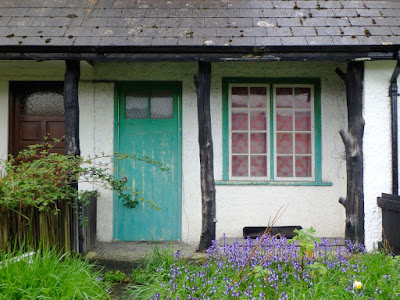In Londonderry, if you’re a Loyalist, but Derry if Nationalist - so take your pick - the Union Jack flies …
… above ancient walls that overlook …
… the working class, Catholic Bogside …
… where the Irish flag flies. My reporting in Northern Ireland had me in Belfast and elsewhere, although never here. The was where some of the worst violence occurred, but not on my watch. Still, it’s an easy trip from Belfast and I’m on holiday.
Inevitable graffiti and more murals. The woman in red is Bernadette Devlin, who led a campaign for Catholic Civil Rights, became (at the time) the youngest MP elected to Westminster, was shot by Protestant paramilitaries and survived.
But it is another destination that particularly attracts me because I was involved.
In 1979, my London newsroom teletype began chattering. Lord Louis Mountbatten, last Viceroy of British India and Prince Charles’ great uncle, had been killed by an IRA bomb in County Sligo. I kept the initial wire report.
The world’s press descended on this glorious stretch of Irish coast. Mountbatten …
… whose holiday home was nearby in Classiemore Castle, had been out on a small boat.
I stand in the warm spring sunshine and remember. Not only was Mountbatten killed, but also his fourteen year old grandson and a fifteen year old Irish boy.
A little over a week later, I covered Mountbatten’s funeral in London.
For this post, I looked into a box and found my funeral pass, which arrived in a black rimmed envelope from Buckingham Palace. Although I’ve blanked out my name, I’ve kept the ‘Esq.’ , which now seems a quaint formality.
What I do vividly recall is one of my colleagues, who had served under Mountbatten during the war, panning his camera with the funeral cortege as tears streamed down his face.
A few kilometres from where Mountbatten died ...
... W.B. Yeats, winner of the Nobel prize, is buried. I visit the grave.
A line from Yeats’ poem, ‘A Prayer for My Daughter’, seems appropriate. Mountbatten was killed ‘Out of the murderous innocence of the sea’.
(For that quote I must credit a recent, fascinating book. The Storm by Arif Anwar has just been published by Atria Books (Simon and Schuster), New York. Anwar used the same line in a quite different context, although his book also touches on British rule, but in India.)
A few days later, I’m in Adare, a quaint Irish Republic town with quirky cottages and thatched roofs. I’m only here to soak up some atmosphere and quickly have lunch.
However, passing the police station, I notice a plaque. Virtually opposite the station, Detective Jerry McCabe was killed by the IRA in 1996. And this was in the South. Some imprisoned for the killing are now thought to live in the area. Other suspects have never been caught. Recent Irish history lives on.

















